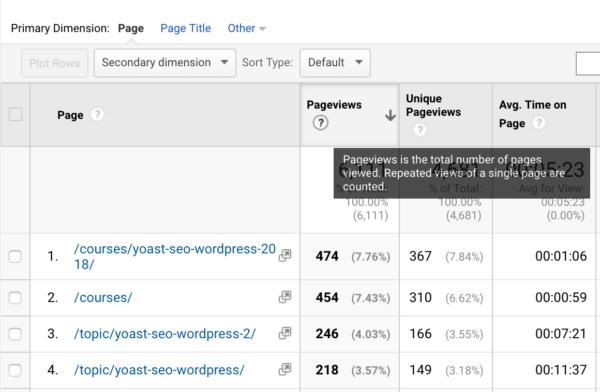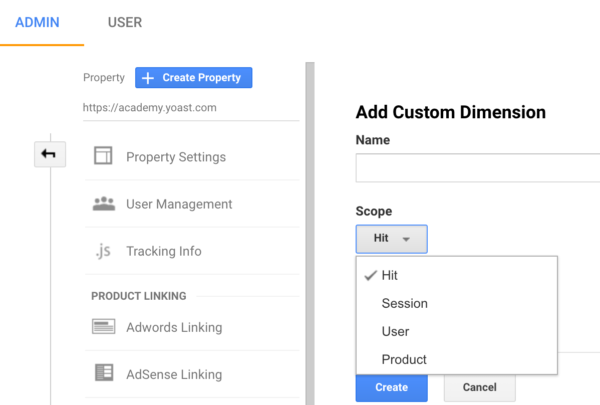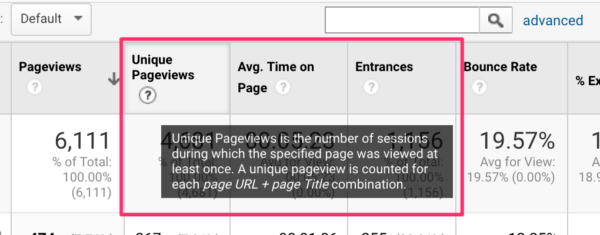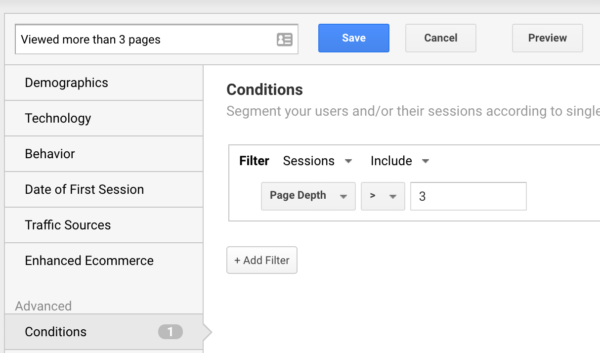What are pageviews in Google Analytics?

When browsing through the ‘Behavior’ section in Google Analytics, you’ll come across the term ‘pageviews’ a lot. And you might think that the more views a page has, the better. But is that actually true? What’s a pageview exactly and can page help you understand your site and audience better? Find out in this post!
First things first, what’s a pageview?
Google Analytics has this handy feature that explains what a certain metric or dimension is when you hover over the question mark icon. According to Google Analytics, the definition of a pageview is:

Pageviews is the total number of pages viewed. Repeated views of a single page are counted.
Google’s Analytics support site provides the following definition:
A pageview (or pageview hit, page tracking hit) is an instance of a page being loaded (or reloaded) in a browser. Pageviews is a metric defined as the total number of pages viewed.
Now that’s a pretty straightforward explanation. So, let’s say you have a page about an All-around SEO course: pageviews will show you the number of times that page is viewed for a given period. The metric itself says nothing about how many visitors saw that page or how many times the page was viewed per session. It’s just the total number of views per page. This means that one visitor can be responsible for a lot of views and that a page can be viewed multiple times per session.
Pageviews in combination with other metrics
Pageviews can give an indication of how popular a post or page is. But having a high number of views for a post doesn’t necessarily mean it is popular. Is it a good thing that you have a lot of views per visit? Does it mean that people like to read a lot of pages on your site? Or does it mean that they can’t find what they’re looking for? A good data analyst is critical of his or her data at all times. A single metric doesn’t tell you a lot; it’s the context that provides the information you can use.
Speaking of context, you might think: “Why don’t I see ‘sessions’, ‘pageviews’ and ‘users’ in one grid table in Google Analytics?” There’s a reason why Google Analytics doesn’t let you see pageviews in combination with sessions and users by default. And that has everything to do with the way Google Analytics collects its data. The Google Analytics data is organized based on scopes. You can see these four different scopes if you want to add a Custom Dimension:

Lunametrics wrote a blog post on understanding scope in Google Analytics, which explains why you can’t combine metrics from different scopes. In short, they say: never combine hit- and session-level metrics. So if you create a custom report that shows views and sessions per page, then you get a report that doesn’t make any sense. Because sessions have hits, but hits don’t have sessions.
Adding context to pageviews
So if you can’t combine user and session metrics to pageviews, what can you do to add more context to this metric?
Unique Pageviews
First of all, you can look at the number of unique pageviews compared to pageviews. According to the question mark in Google Analytics:

Unique Pageviews is the number of sessions during which the specified page was viewed at least once. A unique pageview is counted for each page URL + page Title combination.
I think this definition needs some more explanation. Let’s say a visitor visits a page about a Basic SEO course, then reads a basic SEO article and then visits the page about Basic SEO course again. During this session, the Basic SEO course page is viewed two times. These two pageviews in this single session will be added to the total number of pageviews for that page. But only one unique pageview will be added to the total number of unique pageviews for that page during a single session.
In fact, if you want to see the number of sessions for a page, the best way is to look at the unique pageviews metric. And if you divide the number of pageviews by the number of unique pageviews, you get the average number of times a particular page was viewed per session. It’s a good idea to check the pages for which the number of pageviews differs a lot from the number of unique pageviews. This means that visitors viewed this page a couple of times during a single session. That may indicate that the page is confusing people. But there are other explanations for this as well. Our knowledge base articles, for instance, have a lot of views compared to the number of unique views. People refer to those articles a couple of times during a single session to follow the steps listed in these articles.
Creating segments
You can also look at the number of pageviews per visit and create a segment. That lets you compare groups of users and see where they differ from each other. For instance, visits with more than three views against visits with less than three views.

Are these two groups coming from different sources? Do they read different articles? Do they buy things or not? Comparing groups will help you understand your audience better.
Read more: Analytics basics: Which posts and pages perform best? »
Conclusion
There you have it; an understanding of pageviews in Google Analytics. All in all, it probably isn’t the most spectacular metric you can use in your analysis. And if you do consider it one of the most important metrics in your reports, please reconsider because there are more valuable metrics out there. What do you want to know? And is pageviews the way to get that information? Probably not.
Keep reading: How to prepare yourself for Google Analytics 4 »


Nice Post,
Learned a new thing Today from this Yoast Blog..
My Favorite Plugin since 2015 :D
A good information on analytics. Always its good to learn new things from this blog.Thanks for sharing.
I am not able to connect my website through google analytics everytime i paste the code in analytics plugin in wordpress it shows successful and later it gets unsuccessful. Please someone help me.
Thank you so much for telling me Analytics guide.
great article, very helpful.
Information is in very simple language. Nice!!!
“never combine hit- and session-level metrics… if you create a custom report that shows pageviews and sessions per page, then you get a report that doesn’t make any sense. Because sessions have hits, but hits don’t have sessions.”
I’ve read this many times and just cannot unravel it in my head.
Surely, if you did create such a custom report then you can usefully see how many pageviews per session? What am I misunderstanding?
Let’s say you want to combine a page (hit level) with sessions (session level) then the report shows you how many sessions began on that page. It’s not showing you how many in how many sessions that page is viewed. This is actually a good idea for a new blog post, thanks!
yoast has always been a great place to learn about new things about SEO. This info on google analytics page view is a great one for all bloggers. Thanks for sharing.
I’ve been using page views as a barometer of how popular my blog is but it sounds as if I should be concentrating on users or sessions. Also, weirdly since I moved from blogger to WordPress I have seen a significant drop in page views. Could it be that Google favours its own product?
That’s an interesting hypothesis. Perhaps Google Analytics tracking is implemented differently? Can you see a drop in rankings in Google Search Console? Or drop in pageviews from organic?
Hi,
Google Analytics has many sets of important data but a few people are there who harness it usefully but you are right to say that you have to manipulate the given data best to fulfill your business goal. I liked your deep differentiation about Pageviews per session. Thanks for sharing.
Thanks! :)
hiii, it is good for all.
Thanks for the info!!
Thanks Stijn!
thank you
What a great article!. I am bookmarking it to read it over again after work. It seems like a very interesting topic to write about. Your posts is really helpful for me.Thanks for your wonderful post. I am very happy to read your post. It is really very helpful for us and I have gathered some important information from this blog. I am using it